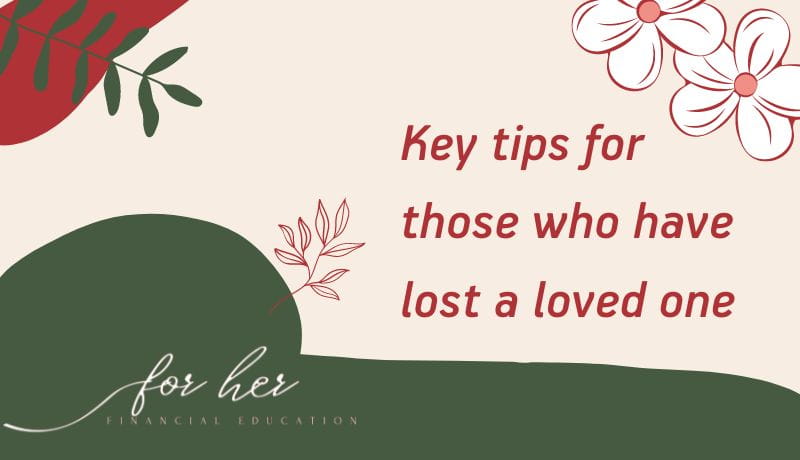Life can change dramatically when a loved one passes away. Whether it’s your spouse or your parent, there will be tough decisions to make, and, in many cases, your financial situation will change. For example, you may have less money if you lose someone who contributes to your family income, or you might inherit a large amount of money. Whatever your situation, losing a loved one is very difficult, and there are a lot of personal and financial decisions to make. To make matters worse, these decisions are made during a time of extreme emotional stress. This article will focus on some of the financial planning implications to consider upon the death of a loved one.
If your loved one has an original signed will, you may find that you have been named the executor of that will. You have several responsibilities in this role. If your loved one didn’t have a will, then you, or someone who will look after the estate, will have to go to court to be appointed the administrator of the Estate. An administrator and executor have the same responsibilities, including:
• Identify and manage assets
• Locate beneficiaries
• Put the will or estate through probate
• Settle bills and taxes
When a person dies and they have a will, the estate is normally distributed according to the directions in the will Depending on the complexities of the estate, you may want to hire lawyers or accountants to help you settle the estate of your loved one. It can be a complicated and confusing process, and professionals can help.
When someone dies, it is as if they have sold all their assets which can trigger tax implications. If there is a net gain, the estate may owe income tax. If there is a surviving spouse, joint assets can typically flow through or roll over to that spouse without tax implications. However, if there is no surviving spouse, all assets are deemed to be sold as of the date of death. Registered plans such as such as Registered Retirement Savings Plans can trigger a huge tax burden that the estate will have to pay before distributing the proceeds. Again, you should consider consulting a professional in this regard to ensure that you minimize tax implications and maximize your inheritance.
If your spouse was working, passes away and was a member of a pension plan, you may be entitled to a survivor’s pension or a lump sum death benefit. If your spouse was retired, passes away and has been receiving a pension from a pension plan, you are typically entitled to a death benefit that is paid in the form of a joint and survivor pension. Some pension plans offer more than one option. Your options will depend on your specific situation and the terms of your pension plan. If your spouse had an annuity when he/she died that was a term annuity, and you were named as the successor annuitant, you will begin to receive the remaining payments.
When parents pass away, any pension they are entitled to or are receiving typically ends with the death of the last of them to die. Depending on their pension choices, there may be a death benefit lump sum paid to named beneficiaries or their estate if there is no beneficiary named. If your loved one was a member of a pension plan, you will need to speak with the administrator to determine if there are any benefits to survivors. Your banker or financial advisor can usually help you roll over money in any registered plans tax-free. An accountant should be consulted when it comes to paying taxes on the deceased’s final tax return.
Once the executor of an estate has liquidated all the assets and paid any outstanding debts and tax liabilities, she will distribute the value of the remaining estate to the beneficiaries of the will (or as per prevailing laws if there is no will.) As a beneficiary of a will, you typically do not have to pay any taxes on the amount you receive because the estate has already paid taxes. What you do with that money is completely up to you. You can invest it, pay down debt, etc. Receiving an inheritance is an opportune time to work with your financial advisor to revise and update your financial plan and decide what to do with your unfortunate windfall.
A windfall is a big, often unexpected financial gain, which might occur because of an inheritance, a property sale, a work bonus, or even a winning the lottery. The key is to ensure you don’t get overwhelmed and that you manage the windfall well. When it comes to deciding what to do with a windfall, planning and consideration are essential. You can avoid wasting money by creating a financial strategy based on your specific objectives. Some of the key considerations are as follows:
- Set aside your windfall funds for the time being. Don’t feel obligated to do anything at first
- Calculate how much you'll have to pay in taxes if any
- Make sure you have enough money in the bank to cover six months' worth of spending
- Speak with a financial advisor
- Use a portion of the remaining funds to help you achieve your life or career goals
Handling these big decisions by yourself can be confusing and overwhelming. Rather than tackling everything alone, don’t hesitate to seek help from professionals, including a financial advisor, attorney, estate specialist and/or accountant, for example. With the proper professional help, you can make more informed financial decisions.
When a loved one dies, coping with the loss if one of the most difficult things you will face. You will likely experience a variety of emotions in the days ahead, and it’s normal to feel lost or unsure of what to do. To allow yourself time to grieve, it’s best not to wait until a crisis to know about your loved ones wishes, investments, insurance, etc. Start today by knowing where copies of wills and trusts are stored and the whereabouts of historical tax records. Hopefully, some of the challenges discussed in today’s article will help you better understand where to start and what to do.
An Investor education and Awareness initiative of Aditya Birla Sun Life Mutual Fund
All investors have to go through a one-time KYC (Know Your Customer) process. Investors to invest only with SEBI registered Mutual Funds. For further information on KYC, list of SEBI registered Mutual Funds and redressal of complaints including details about SEBI SCORES portal, visit link : https://mutualfund.adityabirlacapital.com/Investor-Education/education/kyc-and-redressal for further details.
Mutual Fund investments are subject to market risks, read all scheme related documents carefully







 1800-270-7000
1800-270-7000










